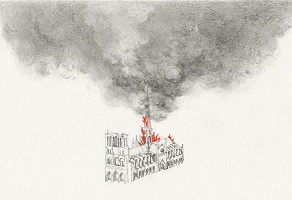Pasolini: faszyzm – konsumpcjonizm – katolicyzm. I poszukiwanie życia
Pasolini: Fascism – Consumism – Catholicism. And a Search for Life
Author(s): Georg SeeßlenSubject(s): Christian Theology and Religion, Cultural history, Social history, Recent History (1900 till today), History of Communism, Film / Cinema / Cinematography
Published by: Instytut Slawistyki Polskiej Akademii Nauk
Keywords: Catholicism; Communism; Consumism;
Summary/Abstract: When it comes to writing about Pier Paolo Pasolini’s oeuvre, nobody can approach it without a subjective and political position. The author of this text takes as his point of departure the presence of the poet and filmmaker in his host country Italy, where the name Pasolini means much more than merely the name of an author. Pasolini stands for the rebellious spirit at a time when the Italian economic miracle was coming to an end, during which a great “contaminazione” (Pasolini), a mutual “infectiousness” took place between the vulgar and the sublime, the culture of the poor suburbs and the discourses of the intellectuals, between old myths and new seductions. In this situation, Pasolini’s texts and films are searching for a way to counter the horror of a new fascism in the form of the petit bourgeois “consumistic” rule with a “force of the past”. Points of reference for this are a radical Catholicism and communism, the latter moving via a Marxist analysis of society to an archaic Ur-communism. Pasolini always saw himself as a stranger. Almost all of his films (leaving aside the vital “Trilogy of Life”, from which he distanced himself in his last and most radical film “Salò”) are attempts to look into the strangeness of the familiar and the familiarity of the strange. In doing so, the author and filmmaker never spared himself; his films are a magic autobiography. To put it another way, Pasolini’s biography makes his films “readable” and his films make the inner history of Italy (and to a certain extent that of Europe as a whole) in the sixties and seventies “readable”, just as in his films bodies make “readable” ideas and ideas make “readable” bodies. Texts on Pier Paolo Pasolini can be markings for these processes of reading. However, they can never be a substitute for following one’s own way which leads back and forth between both the physicality (the reality of the streets, “contaminated” by art history) and the world of ideas (the myth and religion, “contaminated” with Marxism and psychoanalysis).
Journal: Studia Litteraria et Historica
- Issue Year: 2021
- Issue No: 10
- Page Range: 1-20
- Page Count: 20
- Language: Polish

